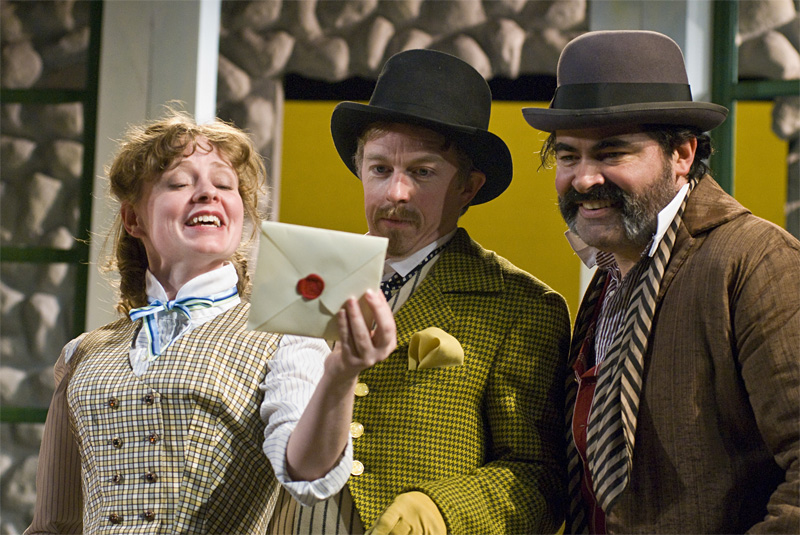Twelfth Night can be a welcome antidote to more standard, cloying, moralistic Christmas repertoire. Indeed, despite being set during the 12 days of sanctioned mayhem following Christmas, the story feels more like a Valentine’s Day romp—a celebration of the zeniths, nadirs, and caprices of affection. Director Stephanie Shine gives generous rein to romantic humiliations in the Seattle Shakespeare Company’s charming Dickens-era production of the play, whose alternate title “What You Will” underscores the absence of those things that can be so oppressive during the holidays—consequences, rituals, obligations. The implied strictures of Victorian morality are an effective backdrop in front of which amorous hell breaks loose.
After whipping up the audience with a word game and a sing-along, Shine cuts directly to Viola’s (Susannah Millonzi) arrival on the shores of Illyria, disoriented, wan, waterlogged from the shipwreck in which her twin Sebastian was lost. This rearrangement of scenes (Shakespeare opens with the lovesick Duke Orsino pining for Lady Olivia) works well, as the opening revels render the contrasting somberness of Viola’s losses the more striking. The tweak also delivers the play to Viola, its rightful owner, rather than embedding her within it.
From a (deliberately) pale beginning, Millonzi’s Viola steadily builds presence, confidence, passion. Her androgynous resemblance to Tim Gouran as Sebastian (and also to Hilary Swank), as well as the way her physical features seem to rearrange themselves from a flaccid blur to resolute beauty, suggest theatrical magic. By contrast, Orsino’s (José A. Rufino) oversized, writhing spasms of lovesickness are pure theatrical camp, neutering his character of nuance and making it hard to imagine what Viola falls in love with (besides the actor’s gorgeousness).
On the other side of the lovescape, noble Olivia (Brenda Joyner) plays her desire for Viola/Cesario straight (and straight-laced), which paradoxically renders it hilarious. Joyner’s Olivia is a Gibson Girl of haughty suffering reduced to horny mortification. The contrast works, and helps us buy the text’s dodgy transfer of her affections to Sebastian, a dim shadow of his charismatic sister.
John Bogar’s Malvolio rends the heart nearly as much as Viola, because like her (and contrary to the play’s subtitle) he gives a damn. Bogar fully lives and breathes Malvolio’s priggish cares and pretentious dreams while Olivia’s bon vivant uncle Sir Toby Belch (Ray Gonzalez) and his saucy mistress (Carol Roscoe) trap him in an adolescent prank. Malvolio may be a stooge, but Bogar plays him with such understated, earnest feeling that he outranks his derisive, carefree (and hilarious) tormentors. Malvolio and his foil, Feste the fool (Chris Ensweiler), anchor opposite ends of a temperamental jump rope that keeps the others hopping.
The Dickensian motif permits Christmas to be in the air in the form of red velvet bows and festive candles, without overt references. Costumes hover somewhere between Bleak House and Alice’s mad tea party, while Feste’s wise fool looks straight out of Victorian fantasies of “the exotic” in turban, loose desert duds, and bare ankles. Similarly exotic musical interludes from flamenco and paso doble to something klezmer-like lend a further note of dark enchantment.
Love, as any 6th grader can tell you, is embarrassing, and this production makes good use of the humiliations. One of the funniest moments comes when Viola duels with foppish boob Sir Andrew Aguecheek (Darragh Kennan), and in their mutual terror their pelvises go into isolated turbo drive. If we can’t own our own dignity (and clearly we can’t), at least we can salve our own shame by laughing at the libidinal throes of others.








